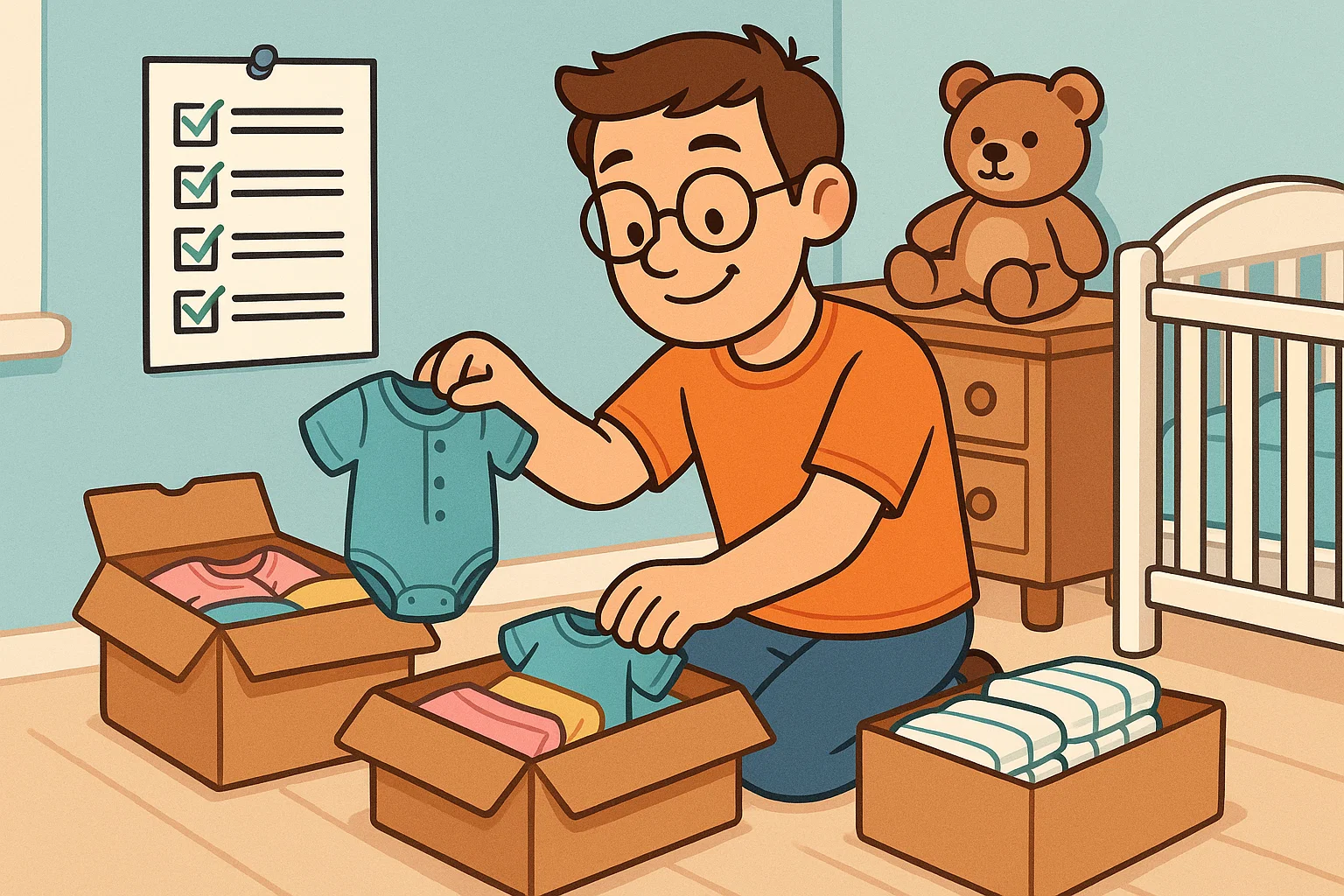Becoming a father transforms your world in ways no amount of preparation can fully capture. The moment you hold your baby for the first time, you’ll experience an overwhelming mix of joy, terror, and profound responsibility that defines the beautiful chaos of early fatherhood.
The transition to fatherhood isn’t just about learning to change diapers or warm bottles. It’s about discovering a new version of yourself while supporting your partner and nurturing a tiny human who depends entirely on you. Early paternal involvement is often linked to increased confidence in caregiving and stronger family cohesion, according to various developmental perspectives.
This comprehensive guide provides actionable advice to help you thrive during those crucial early months, from managing pre-arrival anxiety to creating lasting memories with your child.
Getting Ready for Baby’s Arrival

Preparation is your secret weapon against the overwhelming nature of new parenthood. The more groundwork you lay before your baby arrives, the more confident and capable you’ll feel when those first sleepless nights hit.
Many child development professionals suggest that fathers who actively prepare tend to experience lower stress and adjust more smoothly to early parenting demands. This preparation goes beyond buying a crib—it’s about mental readiness, practical knowledge, and creating systems that support your growing family.
The key is balancing emotional preparation with practical planning. You don’t need to become an expert overnight, but having a solid foundation makes those first weeks far more manageable.
Mental Preparation for Fatherhood
Pre-birth anxiety is a widespread experience among expectant fathers, with many reporting concerns related to finances, bonding, and preparedness. Common concerns include financial pressure, fear of inadequacy, and uncertainty about bonding with the baby. These feelings are completely normal and manageable with the right strategies.
Start with realistic expectations. Your baby doesn’t need a perfect father—they need a present, loving one. Consider these anxiety-reducing techniques:
- Mindfulness practice: Spend 10 minutes daily focusing on breathing or using meditation apps
- Visualization exercises: Picture yourself successfully caring for your child
- Education: Take a newborn care class or read reputable parenting resources
- Connect with other dads: Join expectant father groups or talk with experienced fathers in your network
Research from the Journal of Family Psychology shows that fathers who practice mindfulness report 35% lower anxiety levels and feel more prepared for parenting challenges.
Household and Logistics Planning
Creating a baby-ready home environment reduces stress and helps you focus on what matters most—your new family member. Start with essential purchases rather than getting overwhelmed by every baby product on the market.
An essential baby gear checklist includes:
- Safe sleep space (crib or bassinet)
- Car seat (properly installed)
- Diapers and changing supplies
- Feeding essentials (bottles, formula if not exclusively breastfeeding)
- Basic clothing in newborn and 0-3 month sizes
Role distribution matters. Discuss with your partner how you’ll handle night feedings, diaper changes, and household tasks. Creating a flexible plan prevents confusion and resentment later. Many successful couples use a “divide and conquer” approach where each person takes primary responsibility for specific areas while supporting each other as needed.
Supporting Your Partner and Strengthening Relationship 💑
Your relationship with your partner forms the foundation of your family’s wellbeing. Supportive partner dynamics during the postpartum phase are widely believed to contribute to improved maternal adjustment and emotional recovery.
The postpartum period brings significant physical and emotional changes for your partner. Hormonal fluctuations, sleep deprivation, and the demands of caring for a newborn can create challenges even in the strongest relationships. Your role as a supportive partner becomes more critical than ever.
Communication forms the foundation of this support. Ask your partner what they need rather than assuming—their needs may change daily, sometimes requiring practical help, other times emotional support, and occasionally just space to process their own emotions.
Staying Connected After Childbirth
Maintaining emotional intimacy while caring for a newborn requires intentional effort. Maintaining regular emotional connection can help couples navigate the transition to parenthood with greater resilience.
Daily connection strategies:
- Share one thing you appreciated about your partner each day
- Take 10 minutes to talk without discussing baby logistics
- Physical affection, even in non-sexual forms, remains essential for maintaining emotional closeness
- Express gratitude for specific actions, not just general appreciation
Remember that intimacy rebuilds gradually. Your partner may need 6-8 weeks (or longer) before feeling ready for physical intimacy. Focus on emotional connection during this time—it creates a stronger foundation for everything else.
Be patient with mood changes. Postpartum hormones can cause emotional volatility that has nothing to do with your relationship quality. Offer support without trying to “fix” everything.
Sharing Responsibilities
An equal partnership is not necessarily about a 50-50 split of tasks, but rather about mutual support and shared responsibility. The most successful couples proactively identify what needs doing rather than waiting to be asked.
Effective responsibility sharing:
| Dad’s Primary Areas | Shared Responsibilities | Communication Tips |
| Night diaper changes | Feeding schedules | Weekly check-ins |
| Meal preparation | Doctor appointments | Express appreciation |
| Household maintenance | Visitor management | Adjust as needed |
Take initiative with household tasks. If you see dishes in the sink, wash them. If the diaper bag needs restocking, handle it. This proactive approach reduces your partner’s mental load and demonstrates your investment in family wellbeing.
Taking Care of the Baby Daily
Mastering daily baby care builds your confidence and strengthens your bond with your child. The good news is that babies’ needs are relatively simple—they need food, sleep, clean diapers, and love. The challenge lies in learning to read their signals and responding appropriately.
Don’t worry about doing everything perfectly from day one. Even experienced parents make mistakes, and babies are remarkably resilient. Focus on being gentle, attentive, and willing to learn from each interaction.
Bathing, Diapering, Feeding Basics
Diapering mastery comes with practice, but these tips help you start confidently:
- Keep one hand on baby at all times during changes
- Clean thoroughly but gently, wiping front to back
- Apply diaper cream if you notice any redness
- Secure diaper snugly but not tight—you should fit two fingers under the waistband
Safe bathing practices for newborns:
- Use 2-3 inches of lukewarm water (test with your elbow)
- Support baby’s head and neck with your non-dominant arm
- Start with face washing, then work down the body
- Keep sessions brief (5-7 minutes) to prevent chilling
- Have towels and clothes ready before starting
Feeding support varies depending on whether your partner breastfeeds or you bottle-feed:
- For breastfeeding support: create calm environments, bring water/snacks to your partner, handle burping duties
- For bottle feeding: sterilize equipment, test temperature on your wrist, hold baby semi-upright, pace feeding to prevent overfeeding
Recognizing Baby’s Signals
Babies communicate through crying, body language, and behavioral cues. Learning to interpret these signals helps you respond appropriately and builds trust with your child.
Hunger cues appear before crying:
- Rooting (turning head toward touch)
- Sucking motions or sounds
- Hand-to-mouth movements
- Increased alertness and activity
Sleep cues indicate tiredness:
- Yawning and rubbing eyes
- Decreased activity and interaction
- Fussiness that doesn’t respond to other comfort measures
- Staring blankly or losing focus
Overstimulation signs:
- Arching back or turning away
- Clenched fists
- Hiccupping or spitting up
- Frantic or high-pitched crying
Respond to early cues rather than waiting for intense crying. This approach reduces stress for both you and your baby while building your confidence in reading their needs.
Building Strong Father-Baby Bond 👨👶

Though paternal bonding may differ from maternal attachment in its development, many specialists emphasize its comparable importance for child outcomes, especially in social and cognitive growth.
Bonding isn’t automatic—it’s built through consistent, loving interactions over time. Some fathers feel an immediate connection, while others develop feelings gradually. Both experiences are completely normal.
The key is creating regular opportunities for positive interaction, even during routine care tasks. Your voice, touch, and presence all contribute to your child’s sense of security and attachment.
Skin-to-Skin Contact and Holding
Skin-to-skin contact provides numerous benefits for both you and your baby. This practice, also called “kangaroo care,” regulates your baby’s temperature, heart rate, and breathing while promoting bonding hormone release in both of you.
Safe skin-to-skin practices:
- Remove your shirt and place baby (wearing only diaper) on your bare chest
- Cover both of you with a blanket for warmth
- Ensure baby’s airway remains clear—head turned to side, nose and mouth visible
- Start with 15-30 minute sessions and increase as comfortable
- Practice anytime, but especially effective during calm, alert periods
Confident holding techniques:
- Support head and neck with one hand, bottom with the other
- Keep baby close to your body for security
- Move slowly and speak softly during position changes
- Try different holds: cradle, football hold, upright against shoulder
- Trust your instincts—babies sense your confidence
Skin-to-skin contact, often encouraged by neonatal experts, can enhance bonding and improve caregiving confidence in fathers.
Talking and Engaging Daily
Your voice becomes one of your most powerful bonding tools. Babies recognize familiar voices and find them comforting, even during fussy periods. Frequent verbal interaction from fathers can positively influence early language and emotional development.
Daily engagement strategies:
- Narrate your activities: “Now I’m changing your diaper, and next we’ll wash your hands”
- Use “parentese”: Higher-pitched, slower speech with exaggerated expressions
- Make eye contact: Babies focus best at 8-12 inches—perfect for feeding and holding
- Respond to baby sounds: When baby coos or babbles, respond as if having a conversation
- Sing or hum: Your voice quality matters more than musical ability
Facial expressions and mimicry create powerful connections. Babies are naturally drawn to faces and begin imitating expressions within weeks. Stick out your tongue, raise your eyebrows, or make surprised faces—your baby will often mirror these expressions, creating delightful interaction moments.
Practicing Self-Care and Staying Balanced ⚖️

Self-care isn’t selfish—it’s essential for sustainable parenting. Fathers who neglect their own wellbeing experience higher rates of postpartum depression and burnout, which ultimately affects their ability to care for their family.
Health organizations recognize that postpartum depression affects a notable percentage of new fathers, often presenting differently than in mothers. Maintaining your physical and mental health protects against these challenges.
The goal isn’t perfection—it’s maintaining enough energy and emotional stability to be present for your family over the long term.
Managing Stress and Fatigue
Sleep deprivation and constant demands create significant stress for new fathers. Developing effective coping strategies helps you maintain perspective and emotional regulation during challenging moments.
Practical stress management:
- Sleep when possible: Rest during baby’s naps, even if just 20-minute power naps
- Exercise regularly: Even 15 minutes of walking or stretching reduces stress hormones
- Practice deep breathing: Use the 4-7-8 technique (inhale 4, hold 7, exhale 8)
- Maintain routines: Keep some personal habits that provide stability
- Limit caffeine: While tempting, excessive caffeine can increase anxiety and disrupt sleep
Quick energy restoration techniques:
- Step outside for 5 minutes of fresh air
- Listen to a favorite song with headphones
- Take a hot shower
- Do 10 jumping jacks or push-ups
- Call a supportive friend for 2-3 minutes
Remember that fatigue is temporary. Most babies develop more predictable sleep patterns by 3-4 months, and your body adapts to function on less sleep.
Asking for Help and Setting Boundaries
Strong fathers know when to ask for support. Building a network of helpers—family, friends, neighbors, or professional services—provides crucial backup during overwhelming moments.
Types of support to request:
- Practical help: Meal preparation, household cleaning, grocery shopping
- Childcare assistance: Holding baby while you shower or nap
- Emotional support: Listening without judgment, sharing experiences
- Professional services: Postpartum doulas, cleaning services, meal delivery
Setting healthy boundaries:
- Limit visitors during the first few weeks
- Don’t commit to social events unless you genuinely want to attend
- It’s okay to ignore phone calls when you’re busy or tired
- Protect feeding and sleep times from interruptions
Communicate your needs clearly with family and friends. Most people want to help but don’t know what you need. Specific requests (“Could you bring dinner Tuesday?”) work better than general offers.
Capturing Milestones and Creating Memories 📸

Documenting your early fatherhood journey serves multiple purposes: preserving precious memories, tracking your child’s development, and processing your own emotional transformation. These records become treasured family history and help you appreciate growth during challenging moments.
The key is finding sustainable documentation methods that don’t add stress to your routine. Focus on authentic moments rather than perfect shots—those candid images often become the most meaningful.
Taking Meaningful Photos
You don’t need professional equipment to capture beautiful family moments. Modern smartphones produce excellent photos when you follow a few simple guidelines.
Photography tips for new dads:
- Focus on details: Tiny hands, sleeping faces, first smiles
- Capture daily life: Bath time, feeding sessions, tummy time
- Include yourself: Ask your partner or use timer functions for family shots
- Natural lighting works best: Position near windows during daytime shooting
- Take multiple shots: Babies move quickly—burst mode captures better expressions
Weekly photo goals:
- One photo of baby with each parent
- Close-up of baby’s face showing growth
- Full-body shot showing size development
- Candid moment during daily activities
- Family photo (even if taken with phone timer)
Consider creating a simple photo-sharing system with extended family. Many apps allow easy sharing while maintaining privacy controls.
Keeping a Personal Fatherhood Journal
Journaling provides emotional processing space and creates lasting records of your parenting journey. Research shows that expressive writing reduces stress and improves mental health, particularly during major life transitions.
Journal prompts for new fathers:
- What surprised me most about today?
- How did I handle challenges, and what would I do differently?
- What made me proud of my parenting today?
- How is my relationship with my partner evolving?
- What do I want my child to know about this time period?
Simple journaling methods:
- Voice memos: Record thoughts while commuting or during walks
- Phone notes: Quick entries during feeding sessions
- Weekly summaries: Longer reflections every Sunday
- Photo journals: Combine images with brief captions
- Letter format: Write letters to your future child
Even five minutes of daily writing creates valuable records and emotional processing time. Many fathers find that reviewing early entries months later provides perspective during difficult moments and renewed appreciation for their growth.
Conclusion: Embracing the Journey
Fatherhood is simultaneously the most challenging and rewarding adventure you’ll undertake. The sleepless nights, constant learning curve, and emotional intensity can feel overwhelming, but remember that every father before you has navigated these same waters and emerged stronger.
Your active involvement in your child’s life creates ripple effects that extend far beyond these early months. Research consistently shows that engaged fathers raise children who are more confident, academically successful, and emotionally stable. Your efforts during this crucial period lay the foundation for a lifetime relationship with your child.
Key reminders for the journey ahead:
- Perfect parenting doesn’t exist—consistency and love matter more than perfection
- Your unique style of fathering brings valuable perspectives your child needs
- Asking for help demonstrates strength, not weakness
- Self-care enables better caregiving for your family
- Every small moment of connection builds lasting bonds
The transition to fatherhood transforms you in unexpected ways. Embrace the vulnerability, celebrate small victories, and trust your instincts. Your child doesn’t need a superhero—they need you, imperfections and all.
Welcome to fatherhood. The adventure of a lifetime has just begun. 🌟


